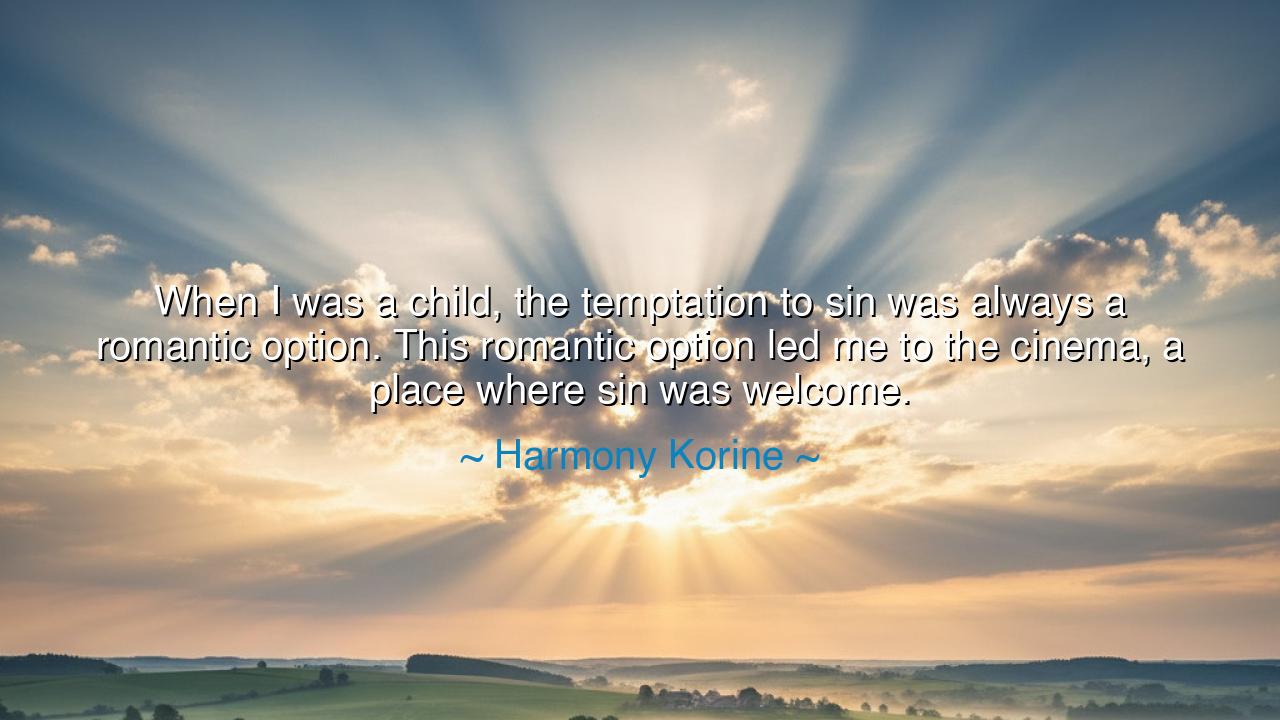
When I was a child, the temptation to sin was always a romantic
When I was a child, the temptation to sin was always a romantic option. This romantic option led me to the cinema, a place where sin was welcome.






Hear the haunting words of Harmony Korine, who declared: “When I was a child, the temptation to sin was always a romantic option. This romantic option led me to the cinema, a place where sin was welcome.” In these words lies a confession that is not only personal but eternal, for every generation has discovered that what society calls forbidden often carries with it a strange allure, a beauty sharpened by danger. To Korine, the cinema was not merely a hall of shadows but a temple of transgression, where the boundaries of morality blurred and the imagination could revel in what the outside world condemned.
The romantic option of sin has always pulled at the human heart. From the Garden of Eden to the myths of Prometheus, temptation has been painted as beautiful, seductive, even noble. What is forbidden gains the glow of mystery. The child, seeing life divided into right and wrong, often finds the “wrong” far more alluring, for it whispers of freedom and adventure. To Korine, this temptation was not found in violence or crime, but in the art of film—where lives of sin, rebellion, passion, and chaos flickered on the screen, daring him to step beyond the boundaries of his childhood world.
The cinema, in his telling, became the sanctuary of sin. Within its darkness, all was permitted: lust and betrayal, crime and madness, desire and despair. Where church or school taught obedience, the glowing screen celebrated rebellion. To a child with a restless spirit, this was not corruption but liberation, the promise that life could be lived outside the rigid rules of ordinary society. Here sin was not punished, but explored. Here, the romantic option of defiance became art itself.
History offers many mirrors to this truth. Consider the uproar when Marlon Brando burst upon the screen in The Wild One, his motorcycle roaring like the voice of rebellion. To many parents, it was dangerous, corrupting, sinful. But to the youth, it was intoxicating. Or think of James Joyce, whose novel Ulysses was banned for obscenity, only later to be hailed as genius. In every age, the cinema and the arts have embraced the forbidden, giving form to humanity’s darker desires and showing them not as demons to be denied, but as truths to be reckoned with.
Korine’s words are not mere provocation; they are the voice of an artist who understands that creativity is born from trespassing. To create something new, one must sin against the old order, breaking the rules that bind imagination. The child who chose the romantic option of sin by entering the cinema was in fact choosing freedom—the freedom to see humanity in all its rawness, its beauty, its ugliness, its contradictions. For what is art, if not the courage to look upon sin and see within it not only corruption but possibility?
The deeper meaning here is that sin, when made romantic, becomes a tool of discovery. Not every sin must be enacted, but every sin must be faced within the heart. The artist does not turn away from temptation but studies it, wrestles with it, transforms it. The cinema allowed Korine to live out these temptations in the realm of images, to see their power and their consequences, to embrace them without destruction. In this way, the dark hall became not only a place of danger but a school of the soul.
The lesson for us is clear: do not fear the romantic option of sin, but approach it with wisdom. Do not deny its allure, for denial only strengthens its hold. Instead, seek to understand it, to see what it teaches about your own heart. Channel it into art, into creation, into reflection. Let temptation lead not to ruin, but to vision. Like Korine, find in the shadows not only danger, but the spark of imagination.
Thus his words, born of childhood memory, become counsel for all generations: the cinema, the arts, and life itself will always welcome sin—not to glorify it, but to reveal it, to wrestle with it, to transform it into beauty. The romantic option is always before you; the choice is not whether you will feel its pull, but whether you will use it to descend into ruin or to ascend into truth.






AAdministratorAdministrator
Welcome, honored guests. Please leave a comment, we will respond soon